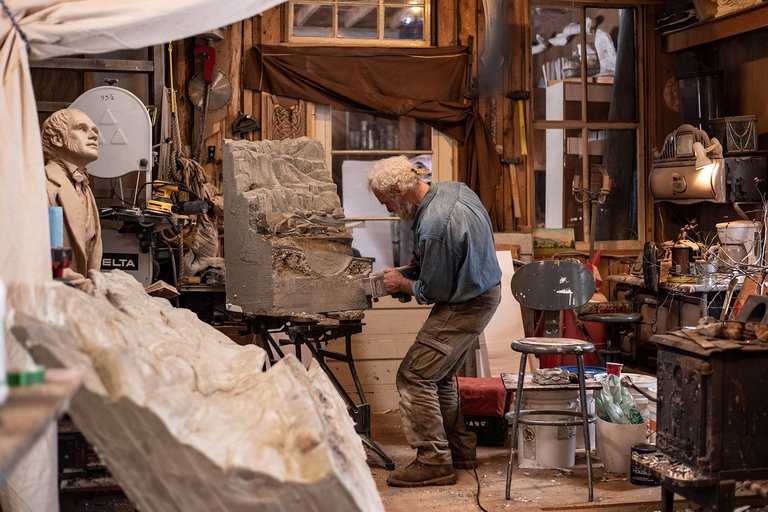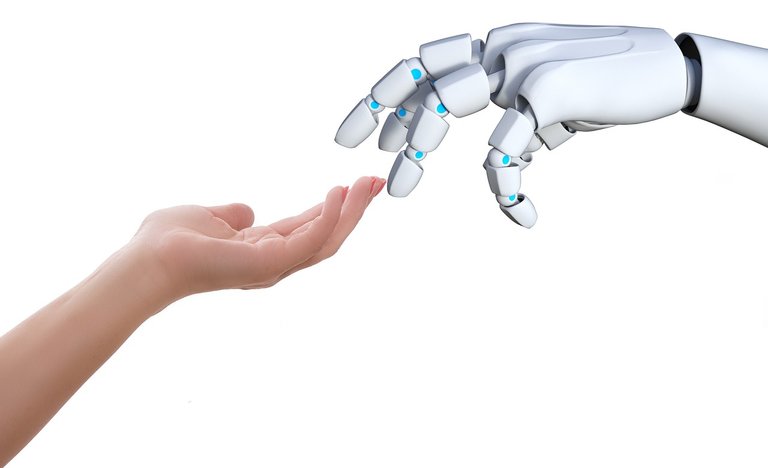https://img.inleo.io/DQmeko82k6adUdWgRPT8xniZvc18jtNnEBbYQeFUx5iXATw/automation-6762812_1280.webp
Hi there everyone, TheRingMaster is back again and as we all know, the world is moving pretty quickly to an era where Robots powered by AI technology dominate the workforce and replace humans in many jobs.
From repetitive jobs done in factories and companies to the technical jobs in industries like healthcare and manufacturing. We now see a rise of highly intelligent AI systems that would make robots very creative and could replace humans in the creative jobs like art, brainstorming business ideas at the executive level of businesses and quality social media content creation.
This is our inevitable future and we have no choice than to embrace it. However, I've got a very important question to ask;
- Who does a better job overall, Robots or Humans? - The main objective of this blog is to highlight the value each brings and leave it to the community and my readers to decide.
With the rise of AI powered robots and the move of having them replace humans - How does this affect the quality of work, products, goods or services?
This is not a theoretical discussion because the decision we're making with robots replacing humans has real consequences for industries, economies and people.
For you to be able to understand this dilemma between Robots and Humans' work, let’s explore different aspects of it and also examine the strengths as well as weaknesses of both parties.
Precision and Efficiency of Robots
"We all make mistakes" how many times in your life have you heard that phrase? - Now that's a phrase that would not be common in a world filled with just robots.
Robots are particularly good at tasks that require accuracy, uniformity, and continuity. They're programming is set in such a way that they're able to carry out tasks perfectly. If there's an error with a robot, it probably stems from malfunction in its hardware or the programers didn't do a perfect job in error handling.
In manufacturing industries for example, robots can do monotonous jobs with a precision unmatched by human beings. Unlike us humans, they don't get tired, they only rely on their power supply and as long as power is still being supplied and no hardware damage has occured, they could work non stop.
This means a business owner that is hell burnt on getting a product made before a particular deadline would not have to have "The Talk" with his employees "If You know what I Mean"
The Robots don’t get tired or make mistakes because they are weary, meaning they can operate 24/7 without requiring breaks. No lunch breaks, no closing hours, no asking for pay raise.
This is why you must adapt quickly and find different streams of income before AI and robots dominate because the business people have seen the advantages robots could bring and since they're primary focus is profits and big revenue, they are prepared to lay many employees off.
Both the precision and efficiency of robots results to great productivity with reduced production cost.
Also in an industry like healthcare, robots could aid doctors in operations thereby ensuring accurate cuts which would mean reduced possibilities for human errors. There will be more successful surgical operation outcomes I suppose.
Businesses that supply products to customers would also have more productivity because robots have no excuses as to why they weren't able to deliver the package to a client on time. The positive impact of robots is truly immense.

The Logic of Human Creativity and Adaptability
When it comes to structured and repetitive processes or jobs, robots are truly outstanding, but I believe it is in areas requiring creativity, critical thinking and adaptability that us humans shine.
Ever heard of "the human touch"
Of course NVIDIA is making great strides with having AI more intelligent and creative but to make them as creative and as adaptive as humans, well we haven't gotten there.
- In fields such as design, arts, and strategic planning, the human factor becomes pretty much indispensable
We are able to introduce innovation into their work, think outside the box, and add an emotional intelligence and empathy that robots cannot achieve. The emotional intelligence part I think would be pretty difficult if not next to impossible to achieve in robots.
Someone asked me "well isn't chatGPT getting creative?" and I answered "who is giving GPT the creative training?" - it cannot do what it hasn't been trained to do. And yes we do have machine learning, but we still have to wait till the day machines can learn emotions.
Humans often provide better customer service than machines do. Robots can be perfect care givers too and probably won't be tired of attending to you like the nurse I encountered some years ago, but I think lots of people may prefer human assistance during certain moments.
Don't get me wrong, artificial intelligence (AI) has made significant progress in recent years especially with the speed at which NVIDIA is moving and the adoption of AI in so many tech industries. However, many customers still prefer to interact with a person who can appreciate and react to their unique circumstances with human level sensitivity.
This ability to create relationships, understand context and deal with surprises is what ultimately distinguishes human beings from any other creatures including the most advanced of AI powered robots.

Collaboration - The Future of Work
There's a lot of fear in people because they see that in a matter of a decade or less, most of the jobs they do for a living would have robots doing it with better precision. However I believe there would be a need to think differently.
Rather than seeing the relationship between humans and robots as a competitive one, I think we should look at it as collaborative. More can be done with the combination of humans and robots than just humans or just robots. This was and still is the primary objective of technology.
There are some tasks that are boringly tedious for humans but also easy for non-human workers like the robots. The whole thing is expected to be producing high general productivity as well as higher job satisfaction levels among employees when robots and humans collaborate.
Let's take for example a modern warehouse where goods are to be transported to clients or customers.
The robots can handle inventory and move goods around while their human counterparts observe the processes and address exceptions by talking to clients themselves. There may be things only humans would understand so they're definitely going to be needed.
In a situation like this, efficiency is improved while the staff members are encouraged to gain new skills and play more demanding roles.
https://img.inleo.io/DQmP2e3HHvGwKKKJ4B9VLozR7tVjKBGmev4EaeBiJbASviy/scale-6470584_1280.webp
Ethical Considerations and the Human Touch
The biggest ethical consideration in the rise of AI powered robots is that many people would be left behind without a job that brings income.
So you don't get caught in the crossfire of AI domination, I shared a blog few days ago talking about other options to earn a good living and even become more successful during these inevitable times.
AI Will Replace Humans In Most Jobs - But This Perspective Saves Anyone
Robot-induced joblessness can result in serious social and economic problems. As I mentioned before, Elon Musk suggested a Universal Basic Income (UBI) where government supports people that lose their jobs to AI but that I believe is not the best solution at all. It comes with so many hurdles and downsides like less motivation to work or contribute to society.
I believe retraining and preparing workers for other jobs becomes important in order to prevent negative implications of automation. We need to know the job that will be available in the near future and start preparing young ones and even those already in the job market for the future.
I also think that there are some fields of work that humans cannot or I'll say should not be replaced with robots. Nursing, therapy, and education depend heavily on the human touch which brings compassion and comprehension, something robots may not have.
It's really tough to say which is better as a standalone, I think it depends on the job or task at hand. They both have their strong points and are most suited to different types of tasks.
The future will necessitate tapping into the strengths of both units so that a collaborative environment is created whereby robots and humans work together well. So I think humans will remain in the workforce and cannot be left behind because we will always need the human touch and even if they're able to create robots with human touch, the very thought that it's not human will make some a bit uncomfortable.
I would love to hear your thoughts on this matter. Thank you so much for the time.
As Always, Let's Make Web 3.0 Great ✊
Posted Using InLeo Alpha



